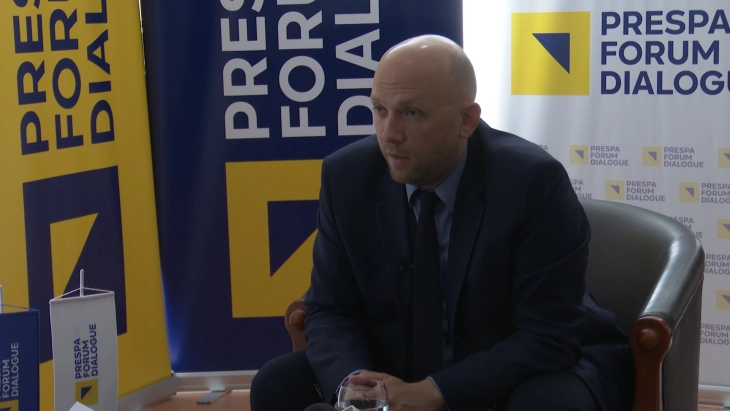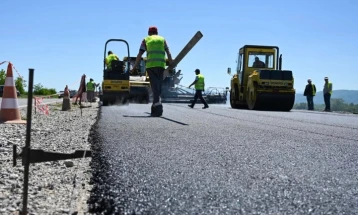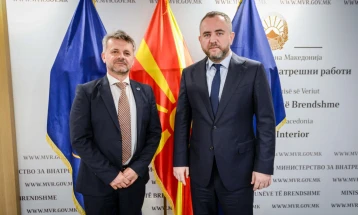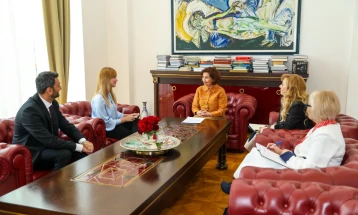Sarrazin for MIA: You don't have time to lose; open clusters now to make EU path irreversible
- North Macedonia doesn’t have much time to lose; if the country starts opening the EU clusters after the constitutional change, its path toward the EU is irreversible, Germany's Special Envoy for the Western Balkans Manuel Sarrazin told MIA in an interview done on the sidelines of the Prespa Forum Dialogue 2023 in Struga.
- Post By Magdalena Reed
- 13:01, 17 June, 2023

Struga, 17 June 2023 (MIA) — North Macedonia doesn’t have much time to lose; if the country starts opening the EU clusters after the constitutional change, its path toward the EU is irreversible, Germany's Special Envoy for the Western Balkans Manuel Sarrazin told MIA in an interview done on the sidelines of the Prespa Forum Dialogue 2023 in Struga.
Mr. Sarrazin, the Bundestag adopted a resolution in support to North Macedonia’s Euro-integration process. What does this resolution mean for us and what kind of impact do you expect this document to have in the country but in the EU as well?
Sarrazin: First, one should not downplay that the Bundestag took the time to prepare this document and have a special conclusion about North Macedonia, because the German parliament and the governing coalition had a rule not to treat single countries with resolutions any more yet they made an exception for North Macedonia.
The next months in North Macedonia are decisive not only for your country but for the spirit of EU enlargement and the whole region. So, it is a commitment and a promise. The MPs told me they were travelling a lot to North Macedonia and many politicians and people they met had told them they had a ‘bad feeling in their stomach,’ fearing about the future of their identity, language and culture in the European Union. Many have asked us to talk to your neighbors about it, but it is not our role to talk to your neighbors about a bilateral conflict.
We of course try to be positive and try to help. It is important to say, "Listen, Germany has a clear position on that, Germany is valuing Macedonian culture, language and identity, and you can count on that. This is a promise from the German parliament, the highest body in German politics, to everybody in North Macedonia; one you can trust."
Germany will also pursue this path in the European Union as well. Because for us, the European Union is a union of diversity like North Macedonia is a country of diversity. The EU is accepting all different languages, identities and cultures, and even fostering them, so we are quite sure that the path of North Macedonia, the path of Macedonian identity, culture and language toward the EU is very feasible. Germany has promised to stand on this path.

The document reads: “The German Bundestag recognizes the Macedonian culture, identity and language. The European Union prides itself on a broad diversity of languages and cultures, and languages represent an integral part of our common cultural heritage. The Macedonian language and culture will further enrich this diversity.” Germany has never disputed any of the above. Is this resolution directly addressed to Bulgaria?
Sarrazin: This is a message to the Macedonians that you can rely on us. I understand that when you feel somebody is denying something that is important for you, then you are focusing a lot on this part and trying to convince and even quarrel about it. But you have friends who don’t deny this and perhaps you should focus more on those who are supportive of you and give you their trust and warm recognition.
Bulgaria is also an important and good friend of Germany. We are also very much engaged bilaterally with Bulgaria, and I am really glad to have them inside the EU. So, this is not a message to Bulgaria. We think the best situation for North Macedonia and Bulgaria is when you all are in the European Union. It’s not at all negative. It is a positive resolution. With it, we wanted to positively reach out to everybody in North Macedonia.

You paid a visit to Skopje less than a month ago and now you are here in Struga. You met with PM Kovachevski and said back then and now that we should use the momentum and focus on the tasks arising from the Negotiating Framework, which include the constitutional revision and incorporation of the Bulgarian minority prior to the second Intergovernmental Conference and the opening of negotiating clusters. What if North Macedonia fails to adopt the constitutional amendments?
Sarrazin: For us it’s quite clear the European Union made a deal to say it was a precondition that you do the constitutional change for the opening of the first clusters. This precondition has been set. It is illusory to believe it could be renegotiated and it is even more illusory to think it could be renegotiated to reach something better than what has been reached last year with the French proposal.
We expect North Macedonia to deliver this, although we know it is not an easy expectation and it’s not easy for North Macedonia to deliver on that. If North Macedonia fails to deliver on that, we would of course respect this decision. It is not about us to decide on your Constitution, it’s about the members of the Macedonian parliament to decide on this, but for us this would also mean that for the time being your parliament is not willing to move forward on the European path.

You have recommended that the opposition VMRO-DPMNE party support the constitutional changes by September. PM Kovachevski and opposition leader Mickoski met recently and there seems to be progress but also setting of conditions. How realistic are the demands of the opposition regarding a delayed enforcement of the constitutional amendments?
Sarrazin: I haven’t talked to Mr. Mickoski about the exact drawing of this proposal so I cannot really comment on it. I can just say we will stick to the Negotiating Framework and we will stick to the second French proposal. I don’t see any room to go out of this. So you would have to ask him or ask me again after I had the chance to talk privately to Mr. Mickoski about this proposal.
Can North Macedonia get a new Negotiating Framework or maybe a guarantee that Bulgaria will not set further conditions related to history?
Sarrazin: If we start to say that two countries made proposals for a better Negotiating Framework, then the next time Ukraine and Poland will come and make some proposals, then Hungary and Ukraine will also do some, or should we perhaps ask Bosnia and Herzegovina and Croatia to make some proposals for the negotiating framework, followed by all of the European Union?
This is what I can tell you: The Negotiating Framework was unanimously decided at the 27 EU Council. We will not start opening such a decision-making process again. It was adopted and it cannot be changed. It is a guarantee for North Macedonia and it cannot be changed easily so that Bulgaria cannot put in new conditions later on. This was one of the key points of last year’s proposal. So it is totally unrealistic that we will open it again. Germany will be against reopening the Negotiating Framework.

The initiative of seven EU member-states, including Germany, for a broader use of the qualified majority voting when passing EU decisions relates to enlargement as well. What are the prospects of this type of decision-making? How realistic is the endorsement of your initiative?
Sarrazin: We know this has been a difficult debate in the European Union since the Lisbon Treaty, since the Single European Act, so it is never easy. In the last decades we have managed to get more qualified majority voting, and it would be really important to get the steps further for the capability of the European Union to have fast decisions at the global level.
We have to discuss this with our friends and partners. A lot of countries, not only from Eastern Europe, are skeptical on that because some small countries are afraid their leverage would be marginalized. But in the case of North Macedonia we can see this can be harmful for positive processes. I cannot predict how this will end but Germany is trying to push this agreement through cooperation and get some more qualified majority voting with this proposal.
Tensions in Kosovo are rising. The international community has called for calm but also new elections in northern Kosovo. How serious is the situation and could the region destabilize, considering the current geopolitical developments and the war in Ukraine?
Sarrazin: Last time I was in Skopje, I tried to explain that North Macedonia doesn’t have much time to lose, because we don’t know what will happen, considering the war in Ukraine. This is the moment that the European Union has asked you to step closer. If you now get to opening the clusters after the constitutional change, I think the path of the country toward the EU is irreversible.
You have made a very important step. Everybody knows that your country will join. We don’t know how fast, but nobody will turn the country around any more. We see what is happening in your neighborhood and how dangerous it is, with violent outbreaks on the streets happening again suddenly after so many years, and what this means for the feelings of the people in this region.
What this says is: ‘Come as soon as possible, as close as possible toward the European Union. Make this path irreversible now, to be more secure for what might come up next.' We don’t know what to expect in the next weeks or months. The next months in the region will be decisive. A positive outcome of the constitutional change vote in North Macedonia would be important for the people's confidence that the region will go forward to the European Union. It would shine a positive light on the region, given these problems in your neighborhood.
This is why we are trying to be— maybe not the best friends of North Macedonia, because we are sometimes critical, too, but be true friends of North Macedonia. And as true friends, we ask you: We know it’s difficult but make this step together with us. You can count on Germany that we will be with you on this path. ik/mr
Violeta Gerov
Photo: MIA
Video: Aslan Vishko







